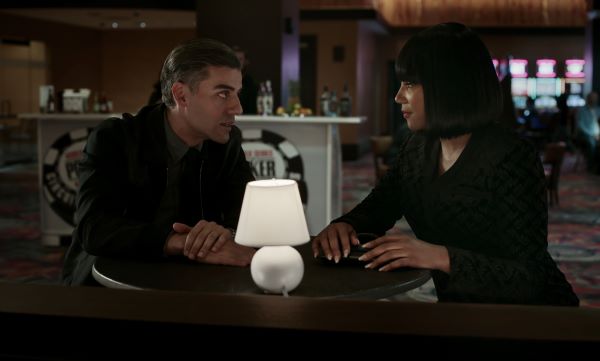
In his new film, writer/director Paul Schrader has some tricks up his sleeve. He allows Oscar Isaac to bask in his leading man status. With slicked back graying hair, sculpted eyebrows, and a steady swagger, the actor never breaks a sweat (however, nor does the movie). His temperament, as a former military interrogator who had served in Iraq and later served time in Leavenworth penitentiary, is cool and methodical, setting the tone for a narrative that broaches many of Schrader’s touchstones: atonement, the road to redemption, and the consequence of one’s actions, all played out under the florescent gambling joints in Middle America. (It was filmed in the casino cash cow region of the Mississippi Delta.)
In a welcome change of pace, Tiffany Haddish co-stars as La Linda, a flirtatious femme fatal–ish ringleader of card sharks. She works for a syndicate of backers, something like an agent, and has had her eye on Isaac’s William Tell—that’s the name he goes by—for some time. She has noticed that he never bets big, yet he always wins, and recognizes his gift: he surreptitiously keeps a mental tally of the cards in play at blackjack. (The film rapidly runs through the game’s points system. Never mind if you don’t keep up, it’s not important. The card games are not where the action is. It’s not that type of movie.) At first, he refuses a potential partnership, as he doesn’t want to call attention to himself. He’s happy scoring $750, which is enough to get by, live in a cheap motel, and strut in a sleek, leather-clad wardrobe.
If war crimes immediately came to mind based on reading the first paragraph above, then you’ve beaten Schrader to the punch. Bill’s experience at Abu Ghraib provides some of his backstory, helping to make him the most complete, motivated, and intriguing character of the lot. For example, when he enters a hotel room for the first time, he covers everything—bed, chairs, desks—in white cloth, as though to sanitize all his surroundings. The film saunters on, though interrupted by Bill’s nightmarish recollections. Yet the flashbacks to the violence inflicted upon Iraqis in the prison, filmed through an anamorphic lens that lend the proceedings the look of a house of horrors, become incongruous and likely not what the director intended: episodes of danger and tension that shake up a film that keeps its cards close to its chest—one could run riot with the metaphors here.
Despite the languorous conversations that provide just enough exposition, some motivations are wedged in. Namely, Bill takes under his wing a young man whose father also served in Abu Ghraib: Cirk (Tye Sheridan), who makes a point to clarify his name begins with a “C.” He hasn’t seen his abusive mom for years, and his father committed suicide years ago. The young man wants revenge for his dad’s supervisor who has escaped unpunished, and asks Bill to join him in hunting down Major Gordo (Willem Dafoe, so you know there will be trouble). No sooner have the two met than they are on a road trip, hitting the gambling joints of America. Now needing the extra income to care for a plus one, Bill joins hands with La Linda, and she begins booking her moneymaker in tournaments, taking half of his winnings—he will be in debt to her bosses if losses pile up.
Trying to be a good guy only gets Bill so far. The film jolts to life when he realizes he needs to take another tact to shake the monotone Cirk out of his inertia and give him a swift kick in the pants, pointing him in a direction other than revenge. (Bill’s right: Cirk admittedly doesn’t read, claims he has no interests, nor has a sense of humor.) This confrontation, which is out of character from the rest of the languid film, finally delivers the menace that Robert Levon Been and Giancarlo Vulcano’s jittery and atmospheric score has hinted at from the beginning. Maybe in a nod to Schrader’s American Gigolo, it also has touches of early eighties Giorgio Moroder.
Such is the film’s cool vibe that another late-in-the-game plot twist elicited two loud guffaws in the lightly attended press screening (Covid protocols, after all). The development certainly felt rote and arbitrary, like a Hail Mary pass, a swift return to the dark denouements by the filmmaker of First Reformed, among many blood-splattered movies. Given that the drama is namely a three hander, there are not so many directions the story line can go, and when it takes an abrupt turn, it doesn’t go all the way, or even to the middle. Restraint is the name of the game. Even Haddish lets loose fleetingly, and the conversations are as sparse as the plain, bare-bone diners where Bill holds court on the road.
Whatever tension the climax has strained toward weirdly dissipates, partly because the camera films the action at a medium distance and most especially as a result of the too casual performances. The antagonists, including Bill, turn into mere chess pieces, to borrow a term from another cerebral sport. All of the characters know their function and accept their fate, or at least sleepwalk toward it. It’s as though Schrader has matched his ambitions with his troubled protagonist, wanting only a modest result.
















Leave A Comment